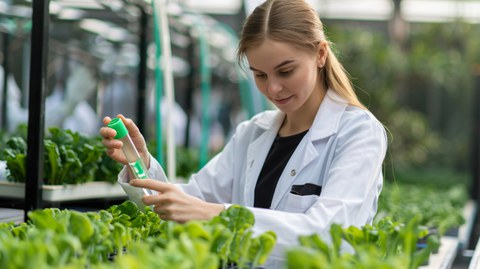Oct 04, 2024
GreenPharming: Pioneering pharmaceutical production project launched in Lusatia

GreenPharming could fundamentally change the pharmaceutical industry.
Research and society are faced with the challenge of finding resource-efficient solutions for the manufacture of biological pharmaceuticals. “GreenPharming” refers to the plant-based production of active ingredients for drugs production. It is now being used for the first time in a scientific project in Lusatia. The project strives to make the production of medicinal products more resource-efficient and thus more sustainable and environmentally friendly in the future. To this end, the researchers are using biogenic raw materials, i.e. plant-based ingredients.
GreenPharming is part of a visionary strategy to overcome numerous current challenges. Initially, tobacco plants, Nicotiana benthamiana, will be grown in Lusatia. Once harvested, they will be processed into pharmaceuticals in a climate-neutral way as part of a fully integrated circular economy and using renewable energies.
Moreover, the project focuses on the production of therapeutic antibodies. For this purpose, the tobacco plants are to produce therapeutic proteins via biosynthesis under realistic laboratory conditions. Compared to conventional methods, such as production in mammalian cells or bacteria, plants offer numerous advantages, such as lower demands on cultivation. What is more important, however, is the ability of plants to make complex changes to proteins after protein production is complete. This step is essential for the functionality of many proteins. In addition, proteins produced in plants are free of human pathogens, which greatly reduces the risk of infection.
Prof. Ali El-Armouche, Director of the Integrative Center for Pharmacology and Toxicology at TU Dresden's Faculty of Medicine, emphasizes: “This project could not only transform pharmaceutical production, but also make a significant contribution to climate protection."
The Free State of Saxony is funding the GreenPharming project with around EUR 5.3 million from the Just Transition Fund (JTF) as part of the InfraProNet 2021-2027 program. The sustainable methods for pharmaceutical production will be developed in cooperation with the Faculty of Medicine and the Faculty of Mechanical Science and Engineering at TU Dresden as well as the Zittau/Görlitz University of Applied Sciences. At the same time, the funding is intended to promote structural change in Lusatia and the transformation towards a climate-neutral economy.
This approach is an example of modern pharmacological research,“ says Prof. Dr. med. Dr. Esther Troost, Dean of TU Dresden's Faculty of Medicine. ”GreenPharming is a project that shows how research, sustainability and societal responsibility can go hand in hand. By using plant systems for drug production, we are not only setting new priorities in biopharmaceutical research, but also making a major contribution to health and environmental protection.”
In addition to production, the comprehensive optimization of the entire production chain – from the biosynthesis of active ingredients in plants to the recycling of residual materials in a closed circuit – is an essential aspect of the cross-faculty project. Prof. Beckmann, Dean of the Faculty of Mechanical Science and Engineering and Director of the Institute of Process Engineering and Environmental Technology, is developing a concept that enables the integration of renewable energies and CO₂ neutral production in fully automated greenhouses. These greenhouses get their energy from renewable sources and use residual materials efficiently to make the production process as environmentally friendly as possible. “With this project, we are taking a big step towards a circular economy,” says Prof. Michael Beckmann.
This means that the GreenPharming project in Lusatia could fundamentally revolutionize the pharmaceutical industry and establish sustainable jobs in structurally weak regions like Lusatia. Combining state-of-the-art biotechnological processes with a clear focus on sustainability will take us one step closer to climate-neutral and resource-efficient production. The European Union's “Green Deal”, which aims to establish a climate-neutral pharmaceutical and chemical industry by 2050, highlights the significance of sustainability as a driving force for innovation in the industry. The GreenPharming project in Lusatia is an example of the necessary shift towards sustainable production technologies. It demonstrates how pioneering solutions can emerge from walking the tightrope between high-tech and nature. For example, other complex molecules, in which structural details are crucial for the effectiveness of a drug, can be produced efficiently and in an environmentally friendly way using plant systems.
Gunda Röstel, Deputy Chair of the German Council for Sustainable Development and Managing Director of Stadtentwässerung Dresden GmbH, says: “The integrative consideration of the environment and efficiency could be the future of pharmaceutical production. The use of biogenic raw materials and plant-based production technologies in a resource-efficient circular economy sets new standards for sustainable pharmaceutical production.”
Contact:
Prof. Ali El-Armouche
Director of the Institute of Clinical Pharmacology
Tel.+49 351 458-6255
https://tu-dresden.de/med/mf/kph
